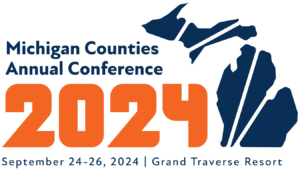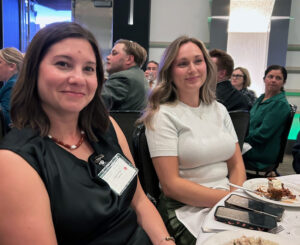Annual Conference opens on Sept. 24; will focus on health, safety
 Experts from the Federal Bureau of Investigation (FBI) and the Michigan State Police (MSP) will discuss the ominous trend of threats against local officials during a plenary session of the 2024 Michigan Counties Annual Conference on Sept. 25.
Experts from the Federal Bureau of Investigation (FBI) and the Michigan State Police (MSP) will discuss the ominous trend of threats against local officials during a plenary session of the 2024 Michigan Counties Annual Conference on Sept. 25.
The conference will run Sept. 24-26 at the Grand Traverse Resort in Acme, Mich.
Kaylee Barker and Nishawn Spiller of the FBI will “delve into the critical roles that Election Crime Coordinators play in ensuring the integrity of our election processes. Participants will gain an understanding of how these coordinators work closely with local, state and federal agencies to detect and prevent election-related crimes.
In the same session, Matthew Helmkamp of the MSP “will provide an overview of the current threat landscape for elected officials and candidates, highlighting key concerns identified by the Michigan Intelligence Operations Center (MIOC) for the upcoming November elections.”
Other conference highlights include:
- Workshops on topics ranging from the impact of Michigan Supreme Court decisions on tax foreclosure sums to the role of county officials in proper emergency response and management
- Elections for five seats on the MAC Board of Directors
- Installation of Melissa Daub, Wayne County commissioner, as MAC’s 116th Board president
- Review and approval of MAC’s policy platforms for 2024-25 (see item below)
While online registration has closed, county officials do have the option to register on-site at the Grand Traverse Resort starting at noon on Sept. 24.
Podcast 83 offers special look at MAC policy platforms

MAC members review and vote on policy platforms at the 2019 Annual Conference at the Grand Traverse Resort. Members return to the resort next week to again adopt platforms at the 2024 Annual Business Meeting.
How MAC develops its policy positions is the subject of the newest episode of Podcast 83.
Host Stephan Currie was joined by the Governmental Affairs team of Deena Bosworth, Madeline Fata and Samantha Gibson to discuss the draft platforms that MAC members will review and approve on Sept. 26 at the 2024 Annual Conference.
“Our internal committees focus on different policy areas,” said Bosworth, “Every year, we also go over our platforms for our membership … We don’t bring every single bill that the Legislature introduces in front of each one of our committees. That would … really not be the best use of our time.
“After the committees do their work, those platforms go to our Board of Directors, and so the MAC Board reviews those policy positions that they’ve taken. … Then those platforms go to our general membership,” she added.
Among proposed changes for this cycle’s platforms are:
- Economic development: “We’ve changed our platforms a bit to say, hey, counties need to be at the table if taxes are going to be abated for economic development purposes, counties need to be involved,” Bosworth explained.
- Mental health: “We really honed our opposition to any attempt to privatize the public mental health system, which keeps coming up session after session,” Gibson reported.
- Septic code: “We’ve talked about (a septic code) at length in the Environmental Committee,” said Fata. “So, we really expanded this section on a statewide septic code and sewage solutions. We included several new bullet points to address some of the concerns that have come out of those conversations.”
To see the draft platforms, visit the MAC website. (NOTE: To access this page, you will need your county’s credentials. If you don’t have them, email Amanda Despins at despins@micounties.org for them.)
Only commissioners who are registered for the conference may participate in the platform voting on Sept. 26.
View the full episode, recorded on Sept. 17, by clicking here.
Previous episodes can be seen at MAC’s YouTube Channel.
And you always can find details about Podcast 83 on the MAC website.
Voting rights bills advance out of Senate; MAC is a ‘no position’
 Contentious bills on voting access passed the Senate along party lines on Wednesday.
Contentious bills on voting access passed the Senate along party lines on Wednesday.
During the Senate’s first voting session since June, the chamber passed Senate Bills 401-404, known as the “Michigan Voting Rights Act.” The bills are meant to bolster federal law and voting rights in the state for members of a protected class and for disabled electors. Local governments were supportive of the concept but offered a number of amendments throughout the committee process to make the practical implementation more feasible.
Under the initial proposal, a member of a protected class could file a complaint with a local unit of government if they felt impaired from participating in elections or the political process. The list of changes made to address local concerns include the creation of a fund for the reimbursement of legal fees, softer language to ensure malintent is evident, and certain stipulations for meetings between plaintiffs and defendants.
MAC does not have a position on the bills considering the number of concessions made by bill sponsors. The bills have been referred to the House Committee on Elections and MAC anticipates they will pass the House and be signed into law in the fall.
For more information on this issue, contact Madeline Fata at fata@micounties.org.
Grants available for ‘low-carbon’ roadway materials
 Local governments now can apply directly for funds to utilize Low-Carbon Transportation Materials (LCTM) for road projects. The U.S. Department of Transportation has made available $800 million for non-state DOT recipients, including local governments, regional planning organizations and tribes, to use construction materials that “have substantially lower levels of greenhouse gas emissions.” These materials include steel, cement, glass and asphalt.
Local governments now can apply directly for funds to utilize Low-Carbon Transportation Materials (LCTM) for road projects. The U.S. Department of Transportation has made available $800 million for non-state DOT recipients, including local governments, regional planning organizations and tribes, to use construction materials that “have substantially lower levels of greenhouse gas emissions.” These materials include steel, cement, glass and asphalt.
The goal is to reduce carbon emissions during the production of these materials, as well as during construction projects, and at time of disposal. About $1.2 billion was previously made available to state transportation departments under the same program.
A one-hour informational webinar will be held on Sept. 25 at 2 p.m. Eastern on this funding opportunity. Click here to register.
Grant applications must be submitted by Nov. 25, 2024.
 |
 |
Madeline Fata and Samantha Gibson were part of the MAC contingent at the 2024 Annual Policy Dinner put on by the Citizens Research Council of Michigan, a MAC affiliate, in East Lansing on Sept. 19. Former state budget director Mark Murray and the late Dr. Kathleen Wilbur were honored by the organization with the Eugene A. Gargaro Public Service Award at the event.
 Staff picks
Staff picks
- Study reveals which U.S. states are most vulnerable to cyberattacks (TechInformed)
- Disaster funding helps U.P. counties recover from 2023 flood (MyUPNow.com)
- Michigan legislators avoid Lansing in 2024, rarely meet as to-do list grows (Bridge Michigan)
- Vessel rescued in English Channel after emergency call to Dover, Delaware, instead of Dover, England (Associated Press)
